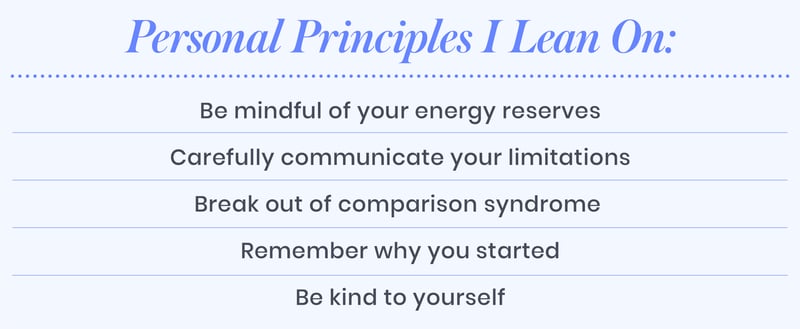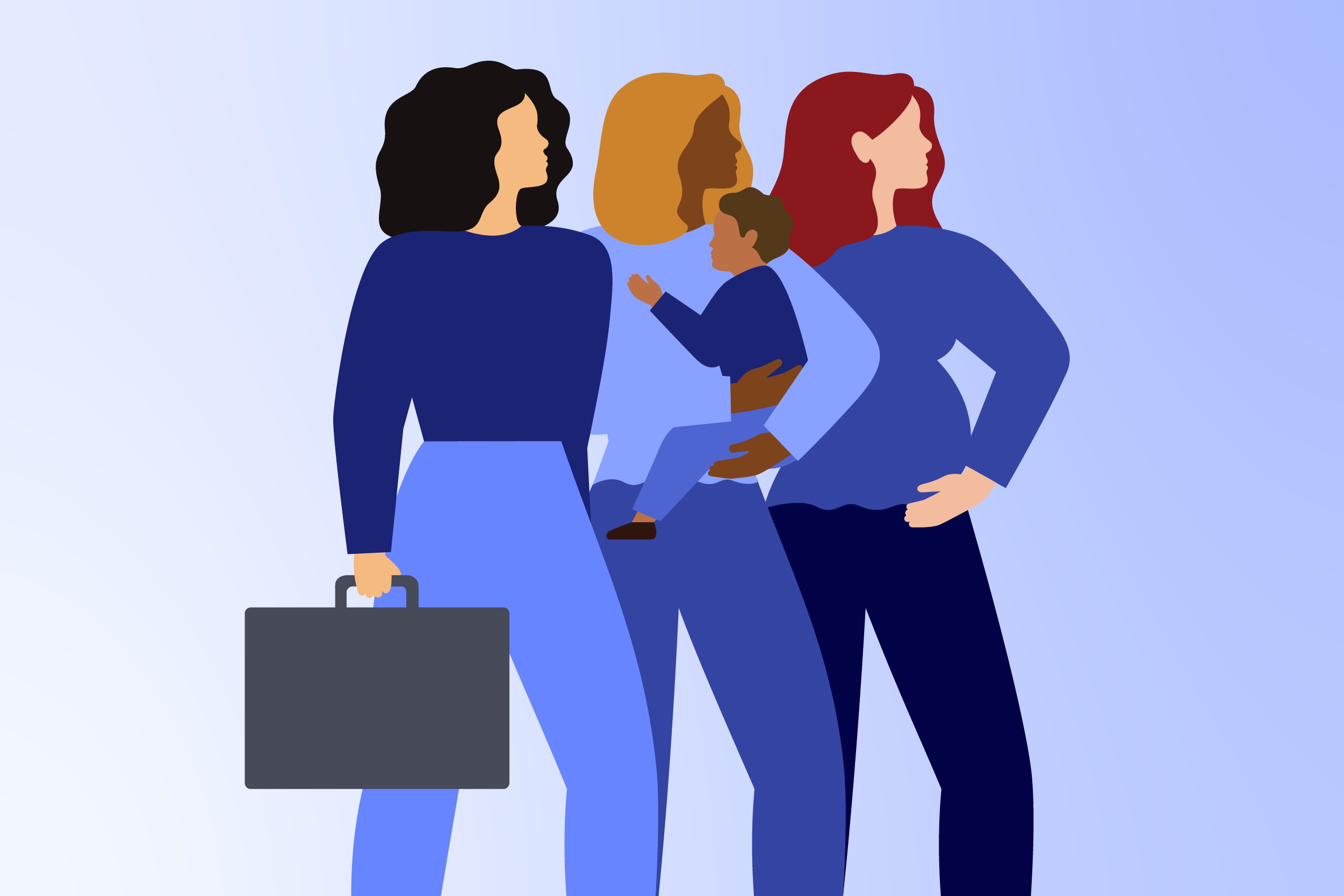This is a guest post by The Mom Project Community members Hannah Olson and Brandi Dean. If you are a Community member with a unique story to share let us know.
Three years ago, Lyme disease derailed my early marketing career in Washington, D.C. I was left with a devastating realization: I had to choose my health or my career. At 22 years old, this was a decision I never thought I’d have to make.
I soon learned that my story wasn’t unique, and that hundreds of thousands of people were experiencing this exact pain point. Rather than letting this fate control my future, I decided to change the workplace for good. I founded Chronically Capable, a talent marketplace that connects chronically ill job seekers to flexible employment opportunities. Our goal is to de-stigmatize illness at work and create a world where nobody has to decide between their health and the work that they’re passionate about.
While I haven’t become a mother just yet, I’ve had the opportunity to meet numerous inspiring parents through our platform who are not only balancing an illness and a career, but also parenthood. One of those people is Brandi Dean. I met Brandi when I first launched Chronically Capable and at the time, she was a working mom who also suffered from Lyme disease, like myself. Now, her young son has also fallen ill and she has a new title on her resume: caretaker. She has garnered the strength to keep pushing forward, despite this triple burden. Her story is one that all mothers need to hear.
Brandi’s story
After 10 years spent recovering from debilitating symptoms due to Lyme disease, I am often asked how I am able to juggle work and motherhood while living with chronic illness. I am the founder of a nationally-recognized nonprofit, Ride Out Lyme, Advisory Board member at the Dean Center for Tick Borne Illness and a self-employed Integrative Nutrition Health Coach. I also have chronic Lyme disease.
As if managing my own health and business commitments isn’t enough, life has recently added another challenge to my day. My 10 year-old son has been diagnosed with a severe case of Lyme and PANS (Pediatric Acute Onset Neuropsychiatric Syndrome). PANS is an onset of neuropsychiatric symptoms such as rage, OCD, irritability and anxiety caused by underlying chronic infections. There is nothing like watching your child struggle with an unbearable illness, while missing out on the things that used to bring him so much joy. It is absolutely heart-wrenching.
In the past six months I have become a self-employed business owner recovering from chronic illness and a full-time caregiver to my son.
Trying to manage all my obligations in order to get through my work day can be challenging. Stress, travel and lack of sleep can trigger a number of debilitating symptoms for me so I have to be very careful about not over-committing myself. When I traveled in the past, I had to make sure that I arrived a day or two earlier to spend one full day recuperating to avoid an adrenal crash and other health problems before my events. Now, the unpredictability of my son’s illness is forcing me to learn to be more adaptable so that I can still pursue a career that I’m passionate about while also being prepared to adjust my sails when something goes awry at home.
Working while living with a chronic illness is not easy. When I’m feeling symptomatic, I can feel overcome with guilt and shame for not operating at the same optimal level as someone who is healthy. In order to reframe my mindset, here are some personal principles that I lean on.

Be mindful of your energy reserves
My passion for helping people living with Lyme disease can sometimes push me beyond my limits. In 2019, the executive director of Ride Out Lyme and I had organized six fundraising events in six cities that were to take place over the course of six months. While I wanted to help our charity scale to its full potential, I knew the schedule was going to leave my tank on empty. By June of 2019, I found myself lying in bed with chronic pain and a feeling of helplessness.
I could not function or carry on a conversation about our non-profit without becoming overcome with emotion. I was incredibly sick, which left me feeling frustrated that I couldn’t handle the job that my healthy counterpart seemed to perform so effortlessly. I spent the next four months recovering from physical symptoms brought on by the immense amount of stress I put myself under. If I had been more mindful of my energy reserves and the need to recoup after every event, I would not have overexerted myself. Perhaps I would not have attended 100% of the events or else I would have brought on more volunteers to help.
Carefully communicate your limitations
I did not fully disclose my limitations to my director as I didn’t want her to think that I wasn’t capable of running a business. That was an unfortunate mistake that led to her leaving the organization just a few months after I got sick. This was a turning point for me and I am now more open about how much I can deliver and what accommodations I will make if I become symptomatic.
Here is how I manage my communication when I find myself in this situation and points for you to consider if you find yourself in the same boat:
- Let others know that you understand what they need, and then describe how you can deliver it if they make accommodations for you.
- Carefully communicate that you understand their expectations and then describe how you can deliver if they make accommodations for you.
- Let them know you will check in periodically to make sure such accommodations are working and make adjustments if needed.
- View your conversation like a work presentation. Take control by checking in with others more than you think you need to about how things are going.
- Consider the possibility that you will be viewed more negatively because you are ill, and minimize and address that to the extent you can, and make your peace with the things you can't change.
- Don’t ever forget the value you add to your company. I believe that those of us who are working while chronically ill often add more value to an organization due to our passion for serving others and our ability to quickly adapt in any situation.
I recently held a 21-Day Cleanse group session for fifty participants during a very challenging time for my son. He was experiencing an intense amount of anxiety that would cause him to scream uncontrollably for hours. Motivating myself to get on a group session call after one of his episodes was challenging. I had spent hours crying and tried unsuccessfully to reapply my makeup while covering the puffiness around my eyes. It didn’t feel right to continue our sessions about overcoming roadblocks and building healthy habits without sharing with my group. So the next day, I posted a video and said, “hey, this is what is happening right now. It really sucks, but I am showing up for you to show you how we all get through the bad shit together. We do it by being honest and vulnerable and leaning on each other when we need to.” It was so well received and allowed others to open up about their own roadblocks. Our group now feels like family as we continue to share our “wells and not wells” while motivating each other to stay on track.
Break out of comparison syndrome
It’s easy to fall into the comparison trap, especially if you are living with chronic illness. Comparisons to others leave us with feelings of inferiority and paralysis. It’s not emotionally healthy. Focus instead on whether you are aiming to become a better version of yourself. Are you constantly trying to level-up to another healthy person in your organization? When you notice yourself doing this, reel it back in and go to the next tip – remember why you started.
Remember why you started
I have this quote hanging in my office to remind me of why I do my job. It keeps me focused and reminds me of what is REALLY important. Clarify your own values and goals and write them down on a piece of paper. This will help you to shift your perspective and feel grateful for what you do provide.
I started the Dean Center for Tick Borne Illness and Ride Out Lyme, Inc. after realizing how many people were lacking affordable care and resources to pay for their treatments. I want to provide strength and hope for those living with this illness. My health coaching business is an extension of my desire to help people living with chronic illness. When the days get long, I always encourage myself to pause, reflect and remember why I started.
Be kind to yourself
In 2019, I had worked myself sick, lost my executive director and was ready to give up. It was a friend who reminded me of the reason why I created this organization while I was still very sick. My vision was to bring thousands of people from all over the country and even other parts of the world together. We raised over half a million dollars and became the largest fundraising charity event ever at SoulCycle. Together, we created a safe and uplifting community for people living with chronic illness. All of the funds raised were provided as grants for people with Lyme in need of financial assistance as well as to support the Dean Center so that people had greater access to affordable care. I could not have persevered unless I stayed mindful of my story, my passion and my commitment to serve others.
When you find yourself wallowing in the negative self-talk that often happens to those of us living with chronic illness…Be kind to yourself.
YOUR story is powerful and you are stronger and more capable because of your unique experience.
Brandi Dean is an Integrative Nutrition Health Coach who is passionate about helping women heal, thrive and live a life of happiness by nourishing their body, mind and spirit. In 2015, Brandi Dean founded Harvard-affiliated, The Dean Center for Tick Borne Illness at Spaulding Rehabilitation Hospital. Her personal experience as a young mother with Lyme disease led her to identify a need for a multidisciplinary center to treat, rehabilitate, and recover individuals suffering from persistent tick borne illness.
Hannah Olson is the co-founder and CEO of Chronically Capable, a digital talent marketplace that connects chronically ill and disabled job seekers to flexible job opportunities. Hannah’s own experience navigating her career while undergoing intensive treatment for Lyme disease sparked the idea for her company, which was founded last spring in Washington DC. Hannah is known globally for her invisible disability advocacy and was recently named Top 100 Powerful Women of 2020 by Entrepreneur Magazine.
There's power in community
The Mom Project's Community is a diverse and welcoming place that supports the journey of working motherhood. 



